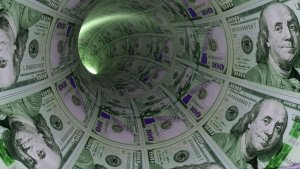A person is walking home late at night and notices an economist searching under a streetlight for his keys. The person stops to help. After searching a while without luck the person asks the economist where he lost his keys. The economist points far off into the dark abyss, to which the person responds incredulously, “Then why the heck are you searching here?” To which the economist responds: “This is where the light is.”
Critics of economics like this joke because it nicely captures what they see as the limitations of economists’ overly mathematical and technical methods.
But in my view, that is the wrong lesson to take from this joke. I argue that for pure scientific economic research, the strategy of searching “where the light is” makes sense. The reason is that the subject matter of social science is highly complex, arguably far more complex than the subject matter of most natural sciences. It is as if the social science policy keys are lost in the equivalent of almost total darkness, and you have no idea where in the darkness you lost them. In such a situation, where else can you reasonably search in a scientific way but in the light? The only way to scientifically search for the keys is to search where there is light, which means letting the available analytic and computational technology guide one’s technical research.
What is stupid, however, is if the economist thinks he is going to find the keys under the lamppost. Searching where the light is only makes sense if the goal of the search is not to find the keys,but rather to understand the topography of the illuminated land and how that landscape relates to the dark places where the keys are lost. In the long run, such knowledge can be extraordinarily helpful in the practical search for the keys, but only in the cases where the lighted areas match the surrounding areas shrouded in darkness.
Which brings me to the Nobel Prize in Economics, which was awarded on Monday to Jean Tirole. Whenever a new Nobel winner is announced they find themselves barraged with questions about their views on the economic issues of the moment. Pundits, after all, need to support their arguments, ideally with quotes from a credible economic expert. And what better surface credibility for economic policy can there be than a Nobel Prize?
It is a mistake, though, to equate a title awarded for excellence in research with an aptitude for policy making. The reason is simple—what makes an economist Nobel Prize worthy is their ability to search under the light, or to develop new lights. It is specifically the Nobel Prize in Economic Science, not a prize in economic policy or in applied economics. Expertise in science does not imply expertise in applied policy. Economic science and economic policy require quite different skills, sensibilities, experience and training, and the economic profession’s failure to acknowledge the difference has made its advice to society far less useful than it could be. It makes it difficult for consumers of economists’ advice to know what part of its advice comes from economic science and what part comes from ideological or other value judgments.
Economists used to have a better understanding of the divide between economic science and economic policy. The classical economist John Neville Keynes clearly defined the distinction between economic research and the “art of economics”—that is, economics applied to policy making—with the methodology of the latter by necessity looser than that of the former. The eminent economist Lionel Robbins wrote in the 1980s of the need for economists making pronouncements about policy to be clear that they are doing so in a “statesman,” not a scientific, role, If not, their statements give an imprimatur of validity to their arguments that those arguments do not deserve.
Generally, the Nobel Committee has emphasized the scientific nature of the prize. But, like the economics profession, it waffles about the relationship between theory and policy, and attempts to blend the two much more than seems desirable. I suspect that this is because they want to recognize that applied policy is an important branch of the economics profession, perhaps the most important branch. They don’t want to leave applied policy out.
I fully agree with this sentiment. But to say that applied policy is an important branch of economics is not to say that economic science and economic policy should be blended into one field. There is no reason that the economics profession cannot recognize different types of skills. Indeed, one of economics’ earliest insights was the usefulness of society taking advantage of individual’s comparative advantages. But somehow the economics profession forgets that insight when thinking about itself.
Theory and policy are quite different. The theoretical search requires little sense of history or literature because what is correct in the past is embodied in the current models and theories. In fact the scientific search is likely aided by an ability to block out much of reality, so that one can know the existing analytic technology backwards and forwards and apply it everywhere. The policy search is quite different. It requires a practical sense of real-world institutions, a comprehensive knowledge of past literature, familiarity with history, and a well-tuned sense of nuance.
This is not to say that Nobel Prize winners in economics are not worth listening to. As bright individuals, they may have bright and useful things to say about policy. But the Nobel Prize alone does not make what they have to say about policy insightful. Ideally, most Nobel Prize winners should respond to policy questions as Chris Sims did when he was awarded the Prize in 2011. When asked if he had any advice for policy makers, he said, “If I had a simple answer, I would have been spreading it around the world.”
Perhaps there is space for a new prize recognizing excellence in the field of economic policy, or the establishment of an Academy of Applied Economic Policy, similar to the Academy of Science, with a mandate to interpret models and provide insight into policy issues to the public in a neutral way. If some mechanism is provided to recognize the importance of those multiple dimensions of policy, the economics field will be better for it. But we should stop relying on the Nobel committee to make this determination for us.



